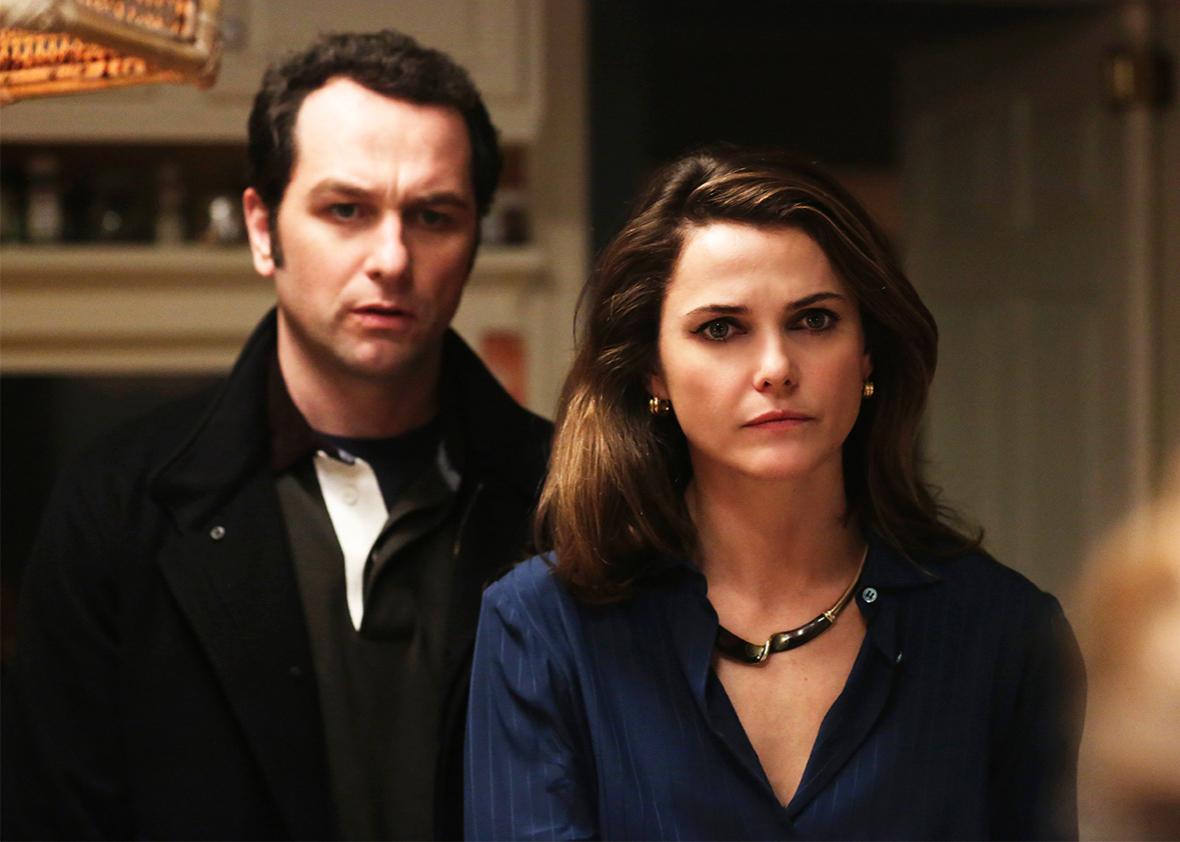Successful espionage requires regularity. Meetings happen in specified locations, at predetermined times. Stakeouts and hunts for information demand patience, and a commitment to detail that would make most eyes glaze over. Divergence from these rhythms suggests that something is wrong, that it’s time to run. It makes sense, then, that after three wildly effective years, The Americans has settled into a bit of a routine.
The fourth season of FX’s Cold War spy drama is a bit of a step down, especially from the near-perfect second and third seasons. Primarily, this is because at this point it’s gotten hard to hide the show’s carefully stitched seams from view. This season is an even slower burn than usual, with even more balls hanging in the air. Secondary characters drift in and out seemingly because they are narratively obligated to make appearances. Even the tensest scenes have a whiff of familiarity. These are the expected, unavoidable signs of aging in any TV show, let alone one that maintains such a precarious balance of tones and moods.
But noting that The Americans is showing some signs of wear isn’t to say that the show is no longer stylish, delightfully off-kilter, panic-attack-inducing entertainment. Matthew Rhys and Keri Russell continue to do spectacular work as Philip and Elizabeth Jennings, the sleeper KGB agents thrown into a sham marriage and family that has become increasingly emotionally real. Though by now the jig is up—we know that Philip and Elizabeth have fully committed to their family unit as the genuine article—the pair continue to effortlessly blur the lines between their relationships as spouses and co-workers. Watching them have parental squabbles in disguise and plan nefarious family vacations is now almost entirely adorable, rather than discomforting.
Instead, the person who is having the most difficult time negotiating a place in the Jennings family is Paige, the eldest child, who discovered her parents’ true identity last season. Holly Taylor continues to be remarkable in a largely thankless role, playing Paige’s reaction to an impossible situation in ways that are surprising yet still make total sense. Above all, Paige is young. She continues to be the character with the most untapped potential on the show, and drawing her into her parents’ world is one of the best decisions The Americans has made. The fallout from her confession to her pastor, a catastrophic situation that should, by all rights, totally derail the show, stretches The Americans’ bleak comedy to its breaking point—largely by complicating the character of the pastor, whose initial silence in the face of literal treason practically defies belief. These kinds of stopgaps are character sacrifices needed to keep a show running.
The success of spies, and spy stories, relies on mystery, and by now we know the Jennings pretty well. When Elizabeth goes to recruit a new asset, it’s a fun and breezy and quick sequence, precisely because the process is almost perfunctory by now. When KGB handler Gabriel (Frank Langella, practically leaking gravitas) introduces a new motivating technology—a bioweapon, which the Jennings need to contain inside their home—it feels less like a genuine threat and more like both a placeholder case-of-the-season, and also a very obvious metaphor. Thankfully, Dylan Baker enlivens this plot immensely as William, yet another scientist who has defected to the Russians and an uptight, unpleasant jerk. It doesn’t matter that The Americans has used this type before—both William and Baker are very good at their jobs.
Trying to understand William is one of the season’s most engaging pleasures in the first few episodes, because everyone else on The Americans is in far too deep, with themselves and with the audience. Annet Mahendru is, as always, riveting as the tragic, steely Nina, but she also continues to be kept at a remove from the rest of the cast, and none of the other characters she interacts with are charismatic or important enough to mitigate her steady drip of melancholy. Poor, poor Martha is now an operative with slightly clearer vision now that Philip has come clean to her—sort of—in his Clark persona. She gives in to his demands, and will continue to do so, because she’s been worked so hard that she no longer has any other options.
The greatness of The Americans comes in large part from its constant state of crisis. Every situation is fraught, each operates according to its own grim logic, nothing feels easy. But most of its characters are now living between precariousness and comfort. They’ve made emotional commitments, for better or worse, and are bound, tragically, by the consequences of those choices. This simultaneously makes it difficult for The Americans to be surprising, and is the source of the season’s greatest potential. There are grisly moments, but nothing that even comes close to approaching the sheer revulsion provoked by something like the infamous suitcase or tooth removal scenes—and without spoiling anything, it takes far more this season for the show to successfully shock. Instead, The Americans has entered a realm where terror is almost totally contained in relationships. Where the first few seasons felt like a slow-gathering storm, the show is now a full-on cloud, just waiting for the right moment to burst.
Disclosure: The Americans was created by Joe Weisberg, brother of The Slate Group’s editor-in-chief, Jacob Weisberg.
